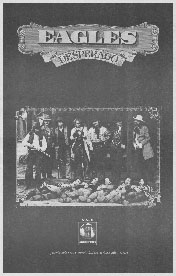![]()
  |

Desperado
Eagles
Asylum 5068
Released: April 1973
Chart Peak: #41
Weeks Charted: 70
Certified Gold: 9/23/74
 If they gave a Grammy for the best interior gatefold cover, this one should be nominated. It is the best since For The Roses, but for hardly the same reason. There they are, the four Eagles and their outlaw compatriots Jackson Browne and John David Souther, tied up on the ground at the mercy of their lawmen roadies, producer Glyn Johns and a couple of deputized friends. The photo is an alleged reenactment of the capture of the Dalton gang in the late 19th century. After shooting this picture, the outside cover and the billboards for Sunset Boulevard, the group dusted themselves off and flew to London to record Desperado, the chronicle of the rise and fall of the Doolin-Dalton renegades.
If they gave a Grammy for the best interior gatefold cover, this one should be nominated. It is the best since For The Roses, but for hardly the same reason. There they are, the four Eagles and their outlaw compatriots Jackson Browne and John David Souther, tied up on the ground at the mercy of their lawmen roadies, producer Glyn Johns and a couple of deputized friends. The photo is an alleged reenactment of the capture of the Dalton gang in the late 19th century. After shooting this picture, the outside cover and the billboards for Sunset Boulevard, the group dusted themselves off and flew to London to record Desperado, the chronicle of the rise and fall of the Doolin-Dalton renegades.
The beautiful thing about it is that although it is a unified set of songs, it is not a rock opera, a concept album, or anything pretending to be much more than a set of good tunes that just happen to fit together. It wasn't until halfway through recording the album that the Eagles and Glyn Johns realized they could string in order as an entity what they were putting down, and as a result only one of the songs, the "Bitter Creek" written after that realization, seems strained.
 Click image for larger view. |
The group hints privately that the Doolin-Dalton experiences are analogous to those of rock stars. Since none of us have been pop heroes, whatever similarities there are will be lost to all but the detective. The few lyrical attempts at articulating truisms are the only real weak spots on the LP anyway.
Nobody needs profundities when he can hear Bernie Leadon's delightful banjo, mandolin, dobro and guitar work and the entire group trading off lead vocals and changing moods. Desperado won't cure your hangover or revalue the dollar, but it will give you many good times. With their second consecutive job well done, the Eagles are on a winning streak.
- Paul Gambaccini, Rolling Stone, 5-10-73.
Bonus Reviews!
This is the best of the cowboy rock bands, hands down and no contest. It is the only one that doesn't run marginally competent steel-guitar playing into the ground, and the only one -- unless you count Clean Living in the category, which would be stretching it a bit -- whose vocals couldn't be improved upon by most anybody's cousin. The Eagles (naturally enough, with their Byrds-Burritos connections) amount, first, to a solid rock band. They build upon that with simple, intelligent acoustic guitar duets and sparing, wise use of such instruments as banjo and harmonica. The steel guitar is also used sparingly. The songs here aren't as catchy as those in their previous album -- nothing here quite cuts it in a head-on comparison with "Take It Easy" -- but this is a casually organized theme album, as the title suggests, and the songs go together well and are consistently good. It almost seems as if, having won acceptance, the Eagles have now chosen a course of slow, steady growth so as to avoid losing sight of their primary and continuing obligation to be tuneful and entertaining. That sort of approach is as rare these days as... well, as eagles.
- Noel Coppage, Stereo Review, 10/73.
This Los Angeles quartet went to London to record this LP of stories. The graphics depict a Western cowboy motif, but the tunes are about basic concerns of men -- love, existence, loneliness. The emphasis is on their soft, velvet-textured harmonic vocal blend, but there are moments of extreme rock intensities. Best cuts: "Tequila Sunrise," "Saturday Night," "Bitter Creek."
- Billboard, 1973.
This model of country rock fusion has turned up on an Alsdorf produced CD sounding cleaner and tighter than anyone could have wished. From the opening strummed chords of "Doolin-Dalton" the quality of The Eagles' studio work is self-evident -- harmonica is mixed well back and perfectly placed in the stereo image on this CD. Orchestral strings and piano are expertly placed in the title track and reproduce with suitable atmosphere. The strummed guitars in "Tequila Sunrise" jump out of the mix with vivid independence; cymbal sound is also surprisingly good.
The only disappointment is a grunting, rather full electric bass sound which may well have come about through injudicious use of bass equalisation during mastering. Voices don't quite have the keenness of a modern recording but the standards are remarkably high for a recording now fifteen years old, only a slight dulling of the sound giving the game away that these magnificent songs were not recorded yesterday.
- David Prakel, Rock 'n' Roll on Compact Disc, 1987.
A concept album equating rock 'n' roll with Old West outlaws, the Eagles' second album contains the hit "Tequila Sunrise," the song "Desperado," which has become a standard, and the recurring "Doolin-Dalton," co-written by J.D. Souther and Jackson Browne. * * *
- William Ruhlmann, The All-Music Guide to Rock, 1995.
![]() Reader's Comments
Reader's Comments
No comments so far, be the first to comment.